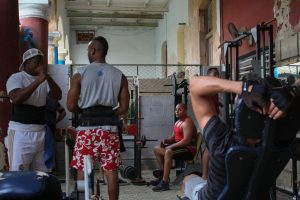College students lean on dietary supplements
Brett Zukunft, a student at California State University, East Bay, heads to the gym six days a week. He works out for three hours each day in order to bulk for the Contra Costa NPC Championships, a bodybuilding competition consisting of 19 body ranking categories, which will take place in Hayward on May 19 at the Chabot College Performing Arts Theatre. Zukunft consumes between 280-300 grams of protein daily, takes dietary supplements and pushes the limits with intense weightlifting. The victory of being in top shape and placing anywhere from first to third place on stage makes it all worth it for him.
As the holidays roll around the gym starts to fill up. College students start what is called bulking season: the period of time in which a person who is training for weightlifting competitions needs to gain muscle in order to perform. Training for competitions that take place year round in areas such as men’s physique or women’s bikini takes a lot of hard work and dedication. Most importantly, it requires dietary supplements to push athletes to the next level.
“I’ll be honest, I never got into bodybuilding to live a healthier lifestyle but to simply look better naked,” Zukunft told The Pioneer. “As I grew up however, I realized that there were a lot of real-world situations in which I wasn’t confident or even taken seriously. Right now I’m coming to the end of my bulk where my goal is to reach 220 pounds by mid-January. I now weigh 219 lbs. I’ll be competing in Men’s Physique where the first competition is in mid-May right here in Hayward.”
According to Clinical Nutrition, an international journal providing essential scientific information on nutritional and metabolic care, the most popular supplement among students surveyed in October 2015 were multivitamin or multimineral supplements 42 percent; individual vitamins 29 percent; protein or amino acids 17 percent; herbal supplements 9 percent; and combination products 6 percent.
According to the National Health and Nutrition Examination (NHANES) survey taken on October 29, 2014, the most popular dietary supplement classified as “other” were: caffeine 16 percent, fish oil 8 percent, echinacea 5 percent, and bodybuilding/creatine supplements 5 percent.
Zukunft is currently in the bulking process which started in October. He will be cutting in early February. Cutting is the process of removing body fat from the body to reveal lean muscle underneath when one is also on a calorie deficit.
Students who exercise to increase muscle mass are also more likely to take protein along with amino acids, according to Elseviar, a platform of science based e-books. College students involved in the bodybuilding process use these dietary supplements to increase muscle strength, endurance and enhancing performance.
National studies indicate a few young, healthy Americans have inadequate intake of required dietary components including protein, most vitamins and minerals. Yet, according to the Clinical Nutrition’s sample, these are the primary components of dietary supplements that most college students were taking. The second most common reason college students are taking dietary supplements is to provide their bodies with more energy.
Science Direct hypothesizes that most students taking dietary supplements to provide more energy are doing so with the intention of increasing mental energy, although most DS do not increase mental energy or motivation. Caffeine, which is present in certain classes of dietary supplements such as combination products and weight loss products, and was taken in the form of dietary supplements by 16 percent of college students in our survey, does appear to increase mental energy, enthusiasm and motivation to exercise.
However, some dietary supplements used by college students do not enhance these functions. Products bought from stores such as Walmart, Target, GNC and Walgreens should be thrown out, as suggested by Renegade Health, a lively and critical commentary on natural health and all types of diets. This is because these products have not been tested sufficiently to determine if they are effective.
In 2013, Canadian researchers used DNA testing on 44 bottles of popular supplements sold by 12 companies. They found many of the products contained none of what they said they did, and were filled with soybeans, wheat and rice instead. One-third of the products did not contain the item advertised on the bottle. Bottles are still available for purchase which is why consumers should review products before consumption.
To check for liability on a product look for the FDA approved and Lab and cGMP tested. Labels will always be on the bottle, Renegade Health states.
Sophia Gaemi, a student at CSUEB, has completed the training process required for bikini competitions. She just recently was a part of the Miss California pageant which she placed top 50.
“It’s a really stressful process going through bulking and cutting season,” Gaemi told The Pioneer. “You have to give up a lot to stick to your meal plan, along with keeping up with daily vitamins and supplements. When the hard work is all over, everything suddenly becomes worth it. I couldn’t of gotten to that next level without my supplements.”
Students benefit from the nutrients and vitamins packed into certain trusted supplements. This sets them up for major health benefits such as energy and aging if taken consistently and while young, according to Clinical Health.
“A lot of people enjoy competing because it is a healthy lifestyle for them, all natural. They want to live their lives to the fullest. I would tell college students to do it. It is a great way to reduce stress for work and school,” Kristie Kakos, V.P. Global Public Relations for Natural Bodybuilding shares with me via email.










